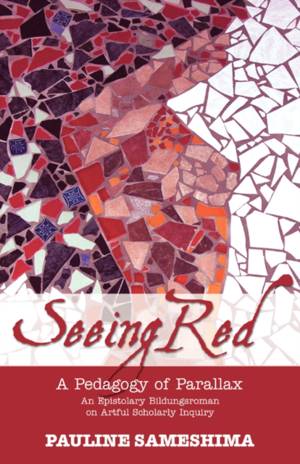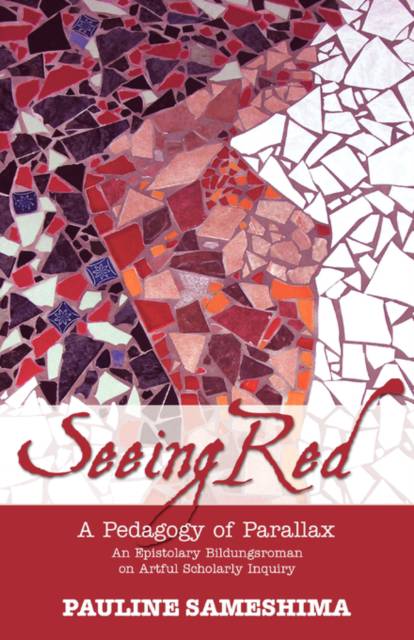
En raison d'une grêve chez bpost, votre commande pourrait être retardée. Vous avez besoin d’un livre rapidement ? Nos magasins vous accueillent à bras ouverts !
- Retrait gratuit dans votre magasin Club
- 7.000.000 titres dans notre catalogue
- Payer en toute sécurité
- Toujours un magasin près de chez vous
En raison de la grêve chez bpost, votre commande pourrait être retardée. Vous avez besoin d’un livre rapidement ? Nos magasins vous accueillent à bras ouverts !
- Retrait gratuit dans votre magasin Club
- 7.000.0000 titres dans notre catalogue
- Payer en toute sécurité
- Toujours un magasin près de chez vous
Seeing Red--A Pedagogy of Parallax
An Epistolary Bildungsroman on Artful Scholarly Inquiry
Pauline Sameshima
Livre broché | Anglais
55,95 €
+ 111 points
Format
Description
A brilliant and daring piece of scholarship, this book will raise eyebrows and spark much debate. It does not simply break new ground, it breaks all the rules¿¿ultimately compelling us to examine and embrace scholarship in fresh, innovative ways. Seeing Red is based on Pauline Sameshima's doctoral dissertation, Winner of the 2007 Arts Based Educational Research (ABER) Outstanding Dissertation Award by the American Educational Research Association (AERA). This award is for the best dissertation that explores, is an exemplar of, and pushes the boundaries of arts based educational research. The book showcases a PhD dissertation written in the form of an epistolary bildungsroman¿a didactic novel of personal developmental journeying. The work is a fiction (letters from a graduate student to the professor she is in love with) embedded in developmental understanding of living the life of a teacher researcher. The work shares the possibilities of how artful research informs processes of scholarly inquiry and honours the reader's multi-perspective as integral to the research project's transformative potential. Parallax is the apparent change of location of an object against a background due to a change in observer position or perspective shift. The concept of parallax encourages researchers and teachers to acknowledge and value the power of their own and their readers¿ and students' shifting subjectivities and situatedness which directly influence the constructs of perception, interpretation, and learning. The novel format ties themes and characters together just as storytelling can bind theory and practice. Norman Denzin (2005) supports the pedagogical and libratory nature of the critical democratic storytelling imagination. He hails this book as "... bold, innovative, a wild, transformative text, ... almost unruly, a new vision for critical, reflexive inquiry." The love story and issues of teacher/learner role boundaries are controversial and largely unspoken of in educational settings and the letter format is voyeuristic. In this sense, the audience is being given a peek, a look at the unrevealed. One of the advantages of the epistolary novel is its semblance of reality and the difficulty for readers to distinguish the text from genuine correspondence (Wurzbach, 1969). The genre allows the reader access to the writing character's intimate thoughts without perceived interference from the author's manipulation and conveys events with dramatic and sensational immediacy (Carafi, 1997).
Spécifications
Parties prenantes
- Auteur(s) :
- Editeur:
Contenu
- Nombre de pages :
- 396
- Langue:
- Anglais
Caractéristiques
- EAN:
- 9781934043646
- Date de parution :
- 31-03-07
- Format:
- Livre broché
- Format numérique:
- Trade paperback (VS)
- Dimensions :
- 140 mm x 216 mm
- Poids :
- 458 g

Les avis
Nous publions uniquement les avis qui respectent les conditions requises. Consultez nos conditions pour les avis.






